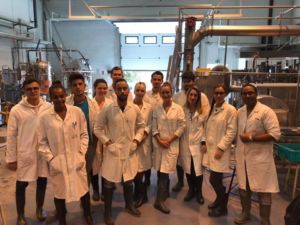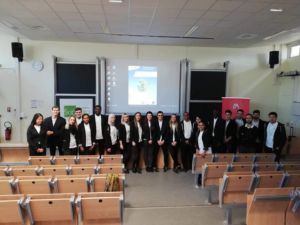Engineering for Eco-Food Design
![]() The "Ingénierie pour l'eco-COnception des Aliments" (ICOA) course, part of the Biology-Agrosciences Master's program, is co-accredited by the University of Montpellier and the Institut Agro de Montpellier.
The "Ingénierie pour l'eco-COnception des Aliments" (ICOA) course, part of the Biology-Agrosciences Master's program, is co-accredited by the University of Montpellier and the Institut Agro de Montpellier.
The ICOA route
From a disciplinary point of view, this pathway is positioned at the interface between process engineering and life sciences, and offers an integrated approach to food design, combining knowledge of processes (physical and biological), implementation, and control of the environmental impact of production processes.
The major disciplinary fields on which the courses are based are engineering sciences : Biotechnology, Food Science, Physical Chemistry, Green Chemistry and Sustainable Process Engineering. This highly multi-disciplinary program enables students to enter the full range of professions in the agri-food industry (production, R&D, quality control) and, more broadly, in all sectors using agro-resources (materials, energy, pharmaceuticals, cosmetics, etc.). It is in line with society's demand for production that is more respectful of the environment, seeking to find ways of recovering the by-products generated and striving for energy sobriety.
The first year of training offers a unique pathway structured around 4 disciplinary areas: biological engineering, food process engineering, bioproduct development engineering and professional integration. It is designed to provide students with the foundations for a dual competence in Process Engineering and Biotechnology and in Food Science. The program's professionalism is underlined byTU in project management and professional integration. Finally, the course is rounded out by cross-disciplinary TU for other Master's courses (English and Biostatistics).
The second year is even more professionally oriented, organized around three major themes for the agro-resource processing industry: intensification of transformation processes, sustainability of supply chains and innovation. It is largely built around a number of project management exercises in which students (i) design and develop new foodstuffs, integrating all the environmental components of the process, and (ii) respond to issues raised by industrial partners in connection with the development of bioproducts.
Each of the two years is punctuated by an internship (lasting a minimum of 3 months in M1 and 5 months in M2), which students can identify from the extensive catalog of internship sites available, or by canvassing the active network of the program's alumni.
For a limited number of students (2 to 3 selected on the basis of the excellence of their academic record) wishing to acquire additional skills in project management, a co-diploma with the Institut d'Administration des Entreprises de Montpellier (IAE Montpellier) can be offered. By choosing an additional 5 ECTS TU related to management themes and organized by the IAE, students can earn a double degree: Master ICOA and Master of Technology and Science Management.
icoa master's objectives
Supporting dietary diversification towards greater consumption of plant resources, setting up responsible supply chains, and reducing losses and waste are all global issues that need to be taken into consideration in a project aimed at a more sustainable food supply. These challenges imply the emergence of new professions in which players will be able to provide technical solutions that respect/integrate all the components of sustainable food systems. The aim of this Master's program is to train scientists capable of responding to these issues and integrating all sectors linked to the processing and valorization of agro-resources, particularly the agri-food industry. It can also provide a springboard for doctoral studies, particularly in the Montpellier region, which is a major European research hub in the field of agrosciences.
Know-how and skills
In addition to their general knowledge of the formulation, sizing and control of food processing and preservation processes, and the tools needed to analyze them, graduates acquire the skills needed to understand and solve the problems of qualitative and quantitative agro-resource management in a context of sustainable development. By integrating a systemic dimension to agri-resource management (food supply and the valorization of by-products and co-products), they demonstrate a solid know-how dedicated to the development of new technologies, their eco-design and industrial ecology, skills that contribute to mastering the transformation of agri-resources into food, materials and renewable energy (to a lesser extent) while respecting the current and future challenges of sustainable research, development and production. A key feature of this program is its specialization in food issues in developing countries.
professional integration
The "Engineering for the Eco-Design of Foods" (ICOA) Master's degree is designed to train and prepare graduates for the professional activities performed by managers in the public and private sectors. Graduates can work in a wide range of professions in the agro-resource processing/upgrading sector (agri-food industries, materials, energy, pharmaceuticals, cosmetics, etc.), in:
- production
- Research & Development
- Quality control
- Patents, Technology watch, Consulting and expertise
Many students also find employment with health agencies, local authorities, NGOs and consultancies.
Finally, those who continue their studies with a PhD will be able to enter the research profession, whether in the private or public sector (researcher or teacher-researcher).
ICOA course leaders
Stéphane Peyron (University of Montpellier, Faculty of Science),Thierry Ruiz (University of Montpellier, Faculty of Pharmacy) & Philippe Bohuon (Institut Agro Montpellier)
The M2 class at the Food Technology Workshop
Class M2 2018-2019 at a training seminar
teaching content
Master 1 ICOA - Teaching unitsTU)
Course content - Semester 1
All TU are mandatory:
- English
- Biostatistics with R
- Richness and potential of agricultural resources
- Functional properties of nutrients
- Food process engineering
- Fluid mechanics
- Biological catalysis and microbiology
- Food structural characterization and imaging
- Internship preparation and professional integration
Teaching content - Semester 2
All TU are mandatory:
Master 2 ICOA - teaching unitsTU)
Course content - Semester 1
All TU are mandatory:
- Continuous and fed-batch bioprocess engineering
- Optimization / Instrumentation of food processing and preservation processes
- Controlling nutritional quality and risks for consumers and the environment
- Food packaging: design tools to reduce food waste
- Integrated management of agro-industry by-products and co-products
- Lifecycle analysis
- Food process simulation tools
- Eco-design methods for new foods
- Developing new food products
Teaching content - Semester 2
Two compulsory TU :

